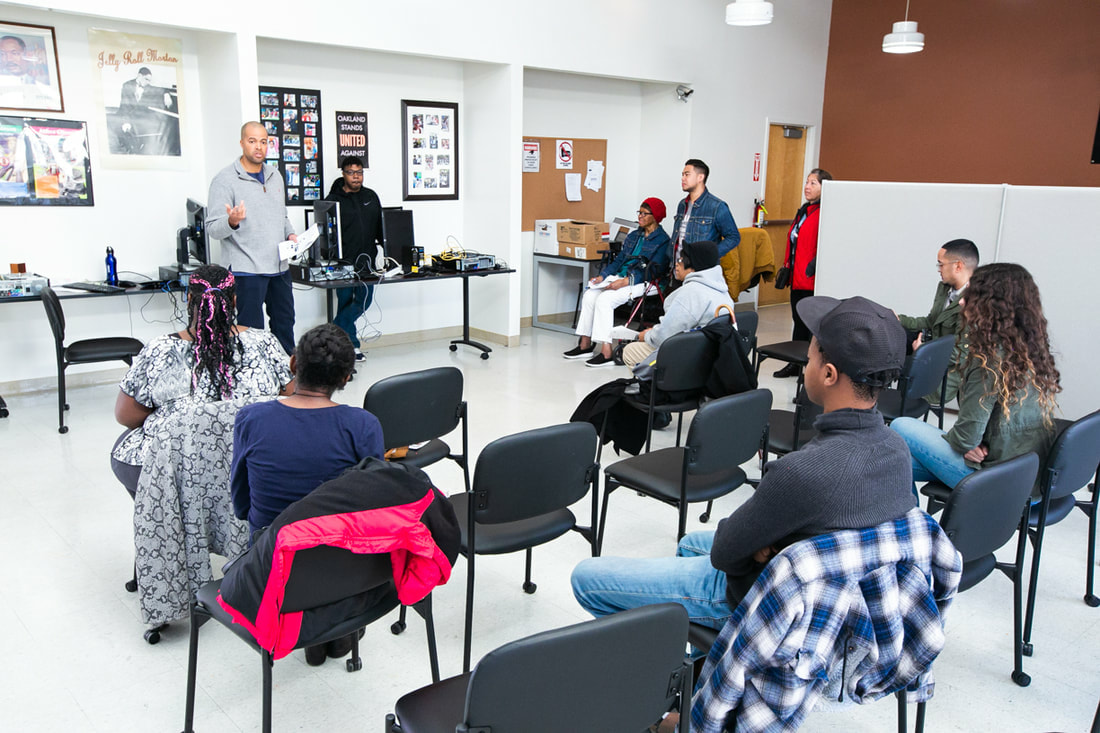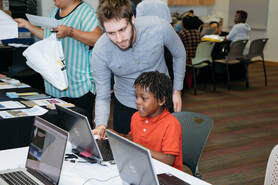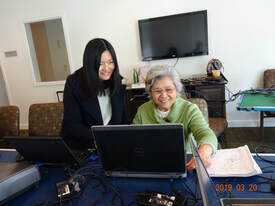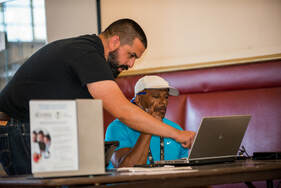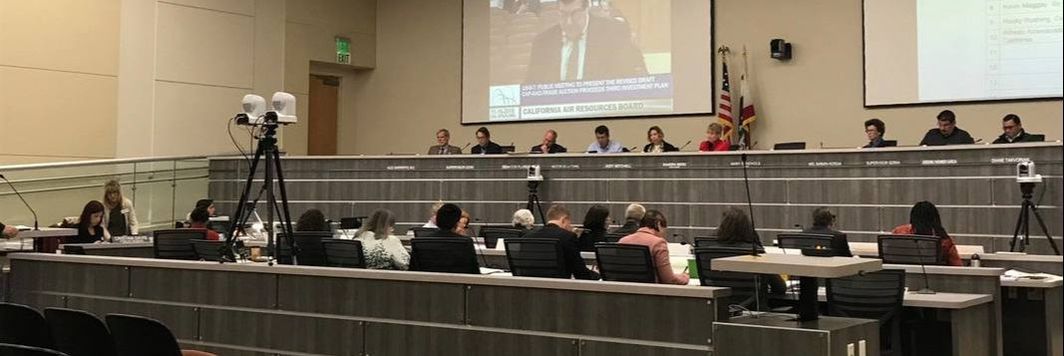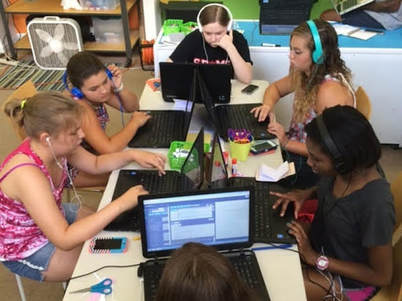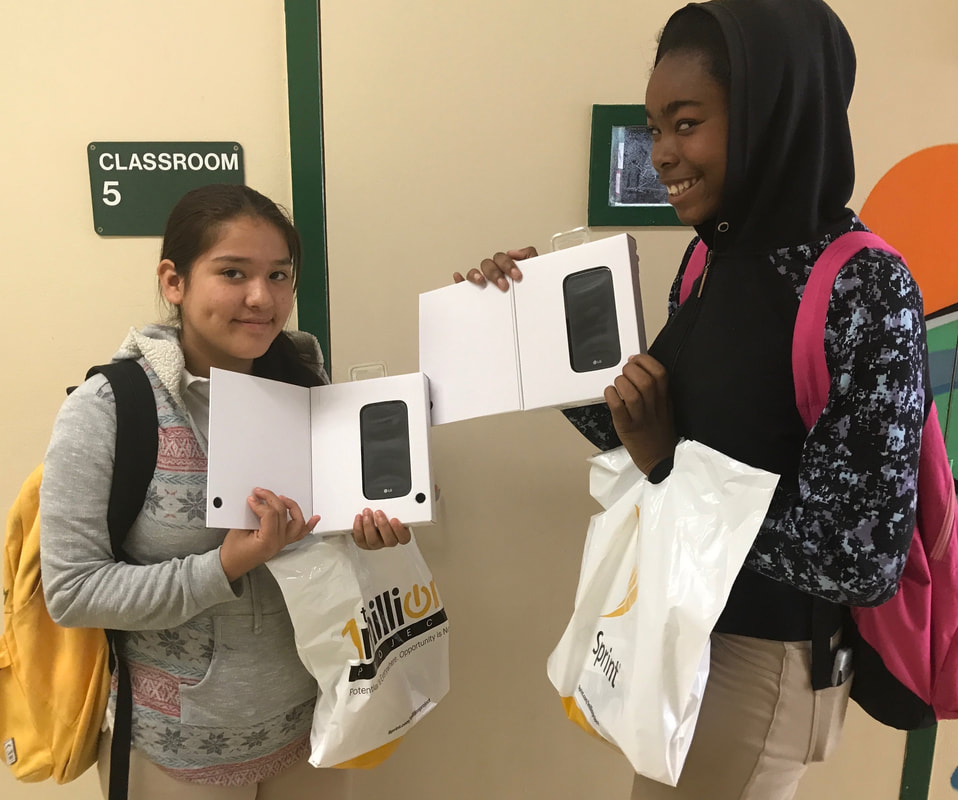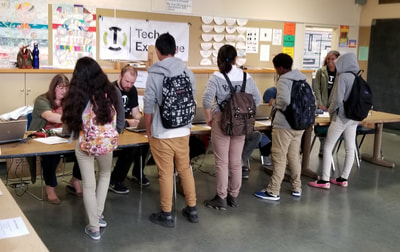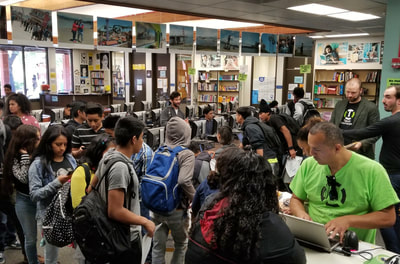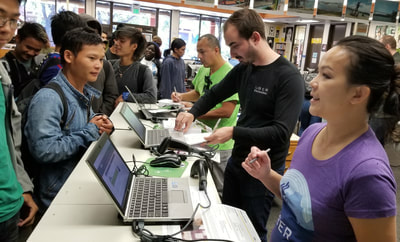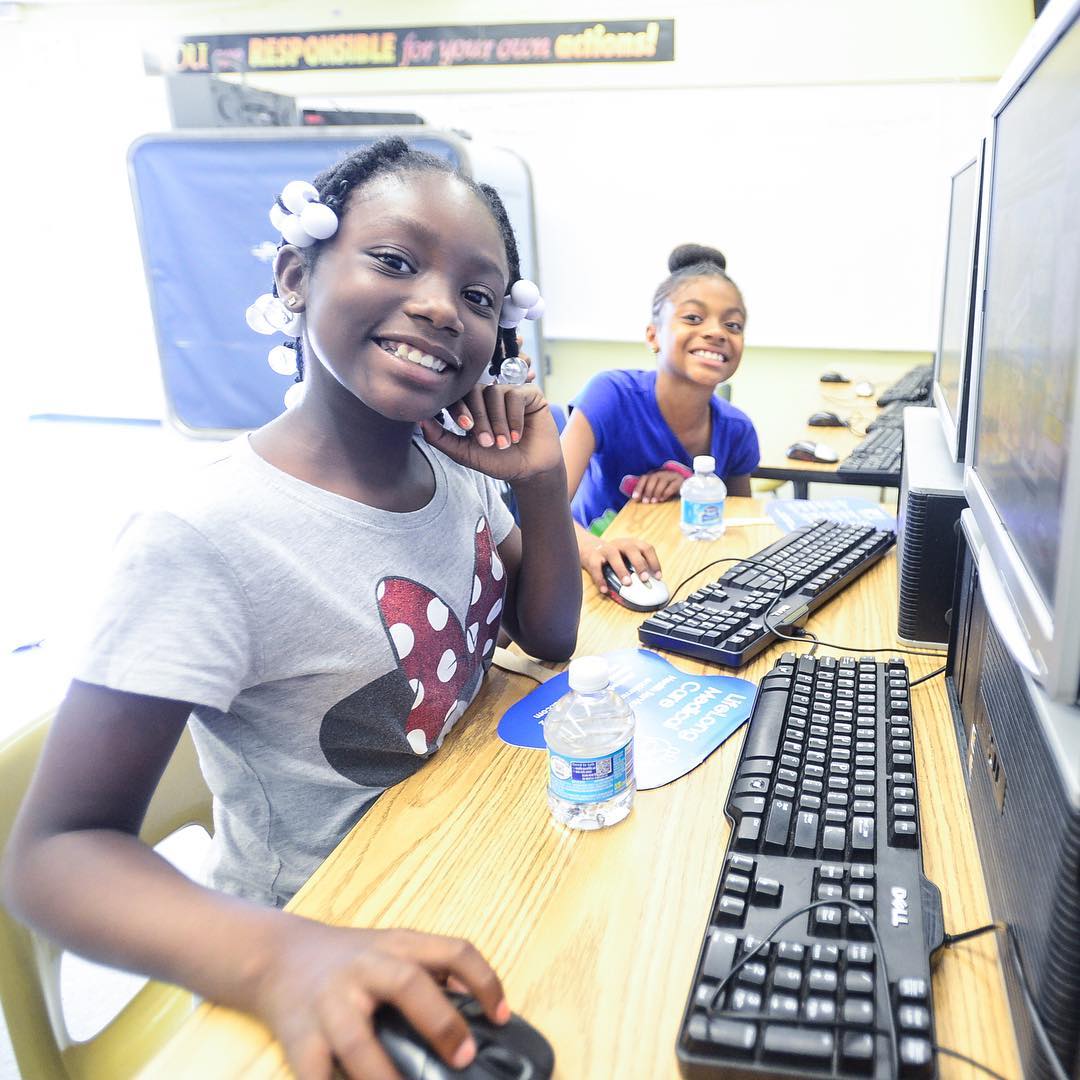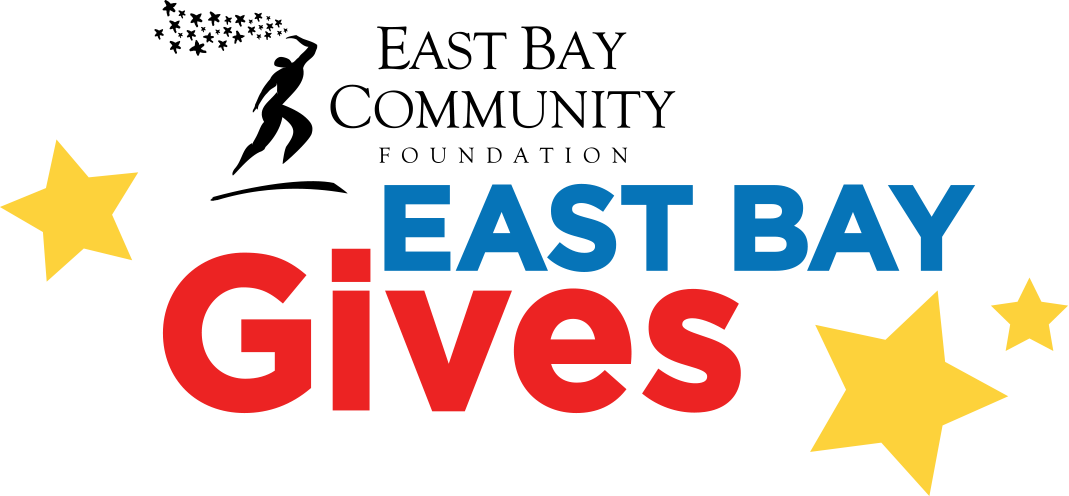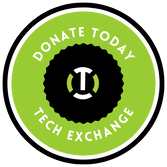|
Picture this: it’s the second semester of your sophomore year in high school, and you’re sixteen years old. You live in a single parent household in a public housing project, who’s making just enough to keep a roof over everyone’s head and feed a family that includes two younger siblings. You work a part-time job during the week and weekends so that you can save money for college; literally every cent goes toward application fees, testing fees, and savings to minimize the amount in loans you know you’ll have to take out. No one in the family makes enough to be able to afford the initial fees of setting up home broadband and wifi - much less a monthly plan - and you can only afford a voice + text plan for your smartphone. This means that you only get internet when you have access to a wifi hotspot. You have a very important paper due tomorrow, and you still need to make revisions before submitting it online. By the time you get off work and rush to the city library, it will close in thirty minutes, and the closest coffee shop has a policy that you must buy something in order to sit and use their wifi. Their cheapest drink is outside of your carefully planned budget.
What do you do? It isn’t fair that anyone should be in the position to have to solve such a conundrum. In a true democracy, full economic, social, and political participation makes a citizen. It’s not out of pocket to say that a person without prompt and continuous access to the internet - in the year 2019 - is a person being denied access to their full citizenship. Unfortunately, this is the situation that millions of Americans find themselves in, including low-income Californians right here in our own backyard. One in four Bay Area residents lives in poverty, and access to technology and tech skills are key to providing a ladder out of that poverty. So here at Tech Exchange, we decided that we would do something about it. Our Tech For Housing program exists so that the situation as described above never happens again. We provide families living in low-income housing with digital literacy workshops that are taught in five different languages. Each workshop is tailored to the needs and priorities of participating residents, who range in experience from beginner to advanced. Upon completion of 8 hours of instruction, each household receives a free refurbished computer with a one year warranty, on-site tech support, and assistance with low cost internet access options. To date, we’ve provided over 25,000 hours of digital training instruction, and currently, we’re servicing 10 different public housing sites across the Bay Area. Families, veterans, seniors, working adults & students alike are closer to economic empowerment as a result of our direct action, and it is our intention to keep going. We’re closing the digital divide a little bit everyday, because internet access and digital literacy is a necessity, not a luxury. Our federal government is behind the curve when it comes to addressing the digital divide. In all honesty, you can count our voice as one of the many authorities pushing for the internet to be treated and regulated as a public utility. However, until that day comes, we will continue to rise to the challenge of bringing full access to information - and therefore full democratic participation - to public housing residents of the Bay Area. To learn more about Tech For Housing and our other programs and services, visit www.techexchange.org for more information. On social media, follow @techXorg on Twitter, Instagram, Facebook and visit our company LinkedIn page: www.linkedin.com/company/techxorg.
0 Comments
Today our Executive Director Seth Hubbert testified before the California Air Resources Board regarding the draft Greenhouse Gas Investment Plan. Proceeds from the Cap & Trade Program produce an 8 billion dollar Greenhouse Gas Reduction Fund that supports programs meant to lower greenhouse gases and deliver benefits to underserved community members.
Below is his statement. ----- Good afternoon Madam Chair and Members of the Board. I’m Seth Hubbert, the Executive Director of Tech Exchange, a social impact organization dedicated to digital inclusion: we help disadvantaged community members sign up for affordable home Internet, provide digital literacy trainings, and refurbish donated computers to provide to our community. We support our clients in communicating with their doctor through a health portal, performing online banking, accessing online educational opportunities and public services, and even setting up home businesses. All of these activities reduce trips, miles travelled, and are a direct strategy to reduce greenhouse gas emissions. Innovation and technology have a huge potential in reducing GHG emissions, however this will go unrealized if bold action isn’t taken to support the 31% of California residents that are un-connected and under-connected. There is another area of our work that directly supports GHG goals: computer refurbishment. Because of cost, many low-income residents, and supporting agencies such as ours, choose refurbished hardware as a first household computer. Computers are nontrivial to manufacture and contain toxic elements. Over the lifespan of a computer’s life, 81% of the energy used comes from manufacturing, and eWaste is our fastest growing waste stream. We are a still a growing operation: last year we refurbished 4000 computers to provide to the community. Utilizing EPA’s Electronics Environmental Benefits Calculator, by upcycling these 4000 computers: • There was air emissions savings of 11,000 metric tons, the equivalent of removing 2300 cars from the road for a year. • These 4000 computers provided a toxic material savings equivalent to doubling mercury levels in 9.7 million tuna. • These 4000 computers provided an energy consumption savings equivalent to power 1300 homes for a year. • Overall, every $1 invested in our organization yield a $1.32 environmental benefit, in addition to the social, economic, and educational benefit our services provide. These numbers represent only our 4000 computers, which is a tiny share of the 150,000 computers that American’s discard daily. We appreciate staff’s time in meeting with us, and as written in the draft plan, it is recommended to seek alignment with all agencies with existing funded programs. Internet access paints with a wide brush and we plan to follow this recommendation. Digital Inclusion has many touchpoints and agencies across the State are finding we can help them reach their goals. However, I’m left with two questions: 1) Does this Board find a digitally connected California, especially our most vulnerable residents, foundational to meeting GHG reduction goals? 2) And what steps can this body take to ensure California's 12.3 million digitally excluded residents can participate in tech-enabled activities necessary to meeting our climate goals. Thank you for your consideration and urge your leadership and ownership of this issue. 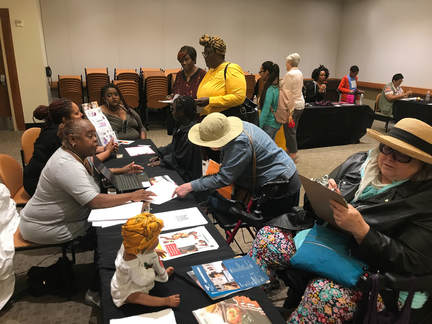 September 15, 2018 - Access to a computer and high-speed internet are more important than ever to the success of the Bay Area’s students, job seekers and families. 53% of adults with incomes less than $30,000 have broadband at home, compared to 93% of those with incomes above $75,000 (Pew Research Center). In the Bay Area alone, 47% of low-income families don’t have access to a computer at home. To address this crucial need, the Berkeley Library, City of Berkeley, Tech Exchange and Comcast Internet Essentials partnered in hosting a Berkeley Tech Fair on September 15th, 2018. The Berkeley Tech Fair successfully attracted an attendance of approximately 300. Among these, 125 attendees walked away with a high-quality refurbished computer, representing just a portion of Bay Area residents who are “digitally dark.” “This event is great! A computer at home is going to make the life for me and my kids much easier, and now they can do their homework at home.” - Gale, Berkeley Resident Providing computer access, broadband access and technical assistance are three critical inputs to closing the divide in our community. The purpose of the Berkeley Tech Fair was to provide a space which empowered students and families to improve their academic, work and personal lives by ensuring they have access to the necessary technology hardware, internet and supportive resources. The Berkeley Tech Fair offered a fun and welcoming space where residents were informed about low-cost internet options, had the opportunity to engage with local community partners, and walk-away with a free desktop computer. Local Community Partners. Partners including Tech Exchange, Berkeley Public Library, Healthy Black Families, City of Berkeley Black Infant Health, Black Girls Code and Berkeley City College took part in the Tech Fair providing community resources, and learning tools to use at home. Low-Cost Internet. Attendees were provided with resources to learn about and sign up for $10/month internet options available through Comcast Internet Essential or AT&T Access Programs. Free Refurbished Desktop Computer. As a pledge to ending the “digital divide”, Tech Exchange supplied 125 attending families with a free high-quality refurbished desktop computer and 70 extended pick-up vouchers. Tech Exchange believes there are enough technology resources in the Bay Area that every low-income family can be connected to a home computer and internet. “We want to ensure that all members of our community have resources, tools, and skills they need to be productive online.” - Seth Hubbert, Tech Exchange’s Executive Director Access to the Internet and digital tools are crucial to gain skills, look for jobs, apply for those positions, and access healthcare. But that access is not equitably spread. The Berkeley Public Library and partners take pride in closing the digital divide. Technology continues to be more important to our society as we increase our reliance upon computers, mobile devices, the Internet, and other technologies to aid our everyday lives! “The Berkeley Tech Fair was definitely a success, we would love to participate as a vendor for the future events to come.” - City of Berkeley Black Infant Health Help Us Eliminate the Digital Divide Volunteers are essential in our mission to get the Bay Area connected. You can get involved. Stay informed and be added to our volunteer contact list by joining here! We welcome all residents to join us in preparing computer equipment for distribution to schools, community centers and homes throughout the city. From the organization’s very beginnings, Tech Exchange has been focused on addressing inequities in technology, especially those inequities that impact low-income students. In the 1990’s Tech Exchange founder Bruce Buckelew helped Oakland Tech High School students to repair and keep their own personal computers, and today the organization is equipping 3,000 Bay Area students and families with free and low-cost computers on an annual basis to close the digital divide.
Thanks to a partnership and exciting initiative with Sprint, this year Tech Exchange is helping to close the digital divide for 3,200 Oakland high school students who will receive the equipment and connectivity they need to complete their schoolwork from home as part of the 1Million Project. Seventy percent of high school teachers assign homework requiring online connectivity, yet more than five million families with school-aged students do not have internet connectivity at home. These students are faced with an enormous challenge as they are unable to complete their homework from home, search for jobs, apply to college and financial aid, or easily access the valuable information they need to succeed in school and life. To close what has come to be termed the “homework gap,” Sprint is distributing 1 million hotspot devices across the country over the next five years. Each Oakland Unified School District student participating in the 1Million Project will receive either a free smartphone, tablet, or hotspot device and 3GB of high-speed LTE data per month for up to four years while they are in high school. Unlimited data is available at 2G speeds if usage exceeds 3GB in a month. Those who receive a smartphone can use it as a hotspot. “Tech Exchange has been working to close the digital divide that exists for low-income Oakland students for the past 22 years,” said Tech Exchange Executive Director Seth Hubbert. “We are incredibly honored and excited to partner with Sprint and the district on the 1Million Project. Together we’re reaching thousands of additional students this school year.” As implementation partner for Oakland, Tech Exchange is coordinating and staffing distribution events at 18 OUSD high schools to put hotspot devices into the hands of OUSD students who lack home internet access. “We all know how challenging homework can be in the best of circumstances, but here in the 21st century, that daily task can be exponentially more difficult for students without internet access at home,” said Oakland Unified School District Superintendent, Kyla Johnson-Trammell. “We deeply appreciate Sprint and Tech Exchange for coming through with this amazing donation of internet access for thousands of our students. It will go a long way to helping them achieve the success they richly deserve.” The 2017-2018 school year marks the first year of the initiative with more 180,000 students in 1,300 schools across 32 states. Every year over the next five years, hundreds of thousands of high schoolers who lack internet access at home will join and benefit from the 1Million Project. The ambitious goal is to connect one million students in that time to help level the playing field and help eliminate the “Homework Gap.” “This is an exciting opportunity to demonstrate how business and education can work together to help close the digital divide,” said Suehyun “Johan” Chung, Northern California Regional President for Sprint. “We are hopeful that the 1Million Project helps to bring greater opportunity to students and families in the Oakland Unified School District and across the country.” Have you or someone you know been helped by Tech Exchange’s programs? Do you support our community work to make sure families get access to technology and internet services and want to help us do more? Tech Exchange is dedicated to providing equitable technology access to people in Alameda & Contra Costa counties. We recognize the need for people from all economic and cultural backgrounds to have a computer, reliable internet service, and skill training as a way to be empowered and self-sufficient members of society. We also provide workforce training in the community, and focus on a reuse and sustainable recycling model that’s good for the environment. We have been an ecologically sustainable, grassroots solution to addressing the digital divide locally since 1995, and each year we exceed our growth goals! May 4 is East Bay Gives, a special day of fundraising for over 200 nonprofits in Alameda and Contra Costa counties. Tech Exchange is participating and is asking you, our community, to consider being part of the day and donating to help fund our vital work! On May 4 you can go to https://www.eastbaygives.org/techxorg and donate online! Your donations can help us win sponsored prizes that will give us added funding! We’ll remind you when it’s time! Use the link at the bottom of https://www.techexchange.org/ to sign up for our newsletter and we will be in touch to remind you on May 4 with the info you’ll need to donate! Then watch us on facebook and twitter to see what’s happening on the day, or stop by our refurbished computer store to say hi! |
Categories
All
Archives
July 2024
|

